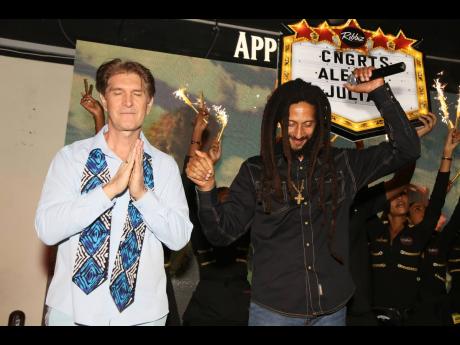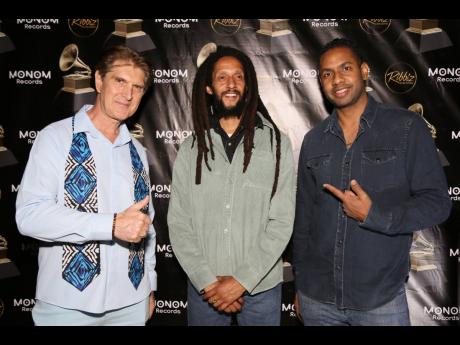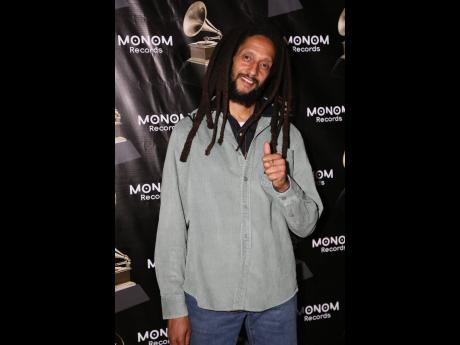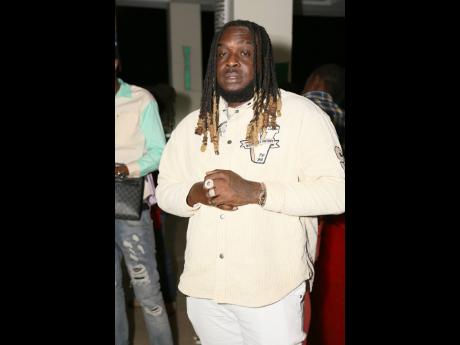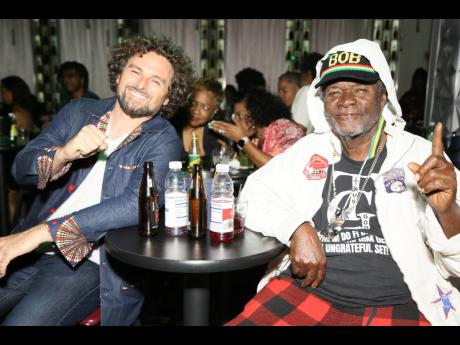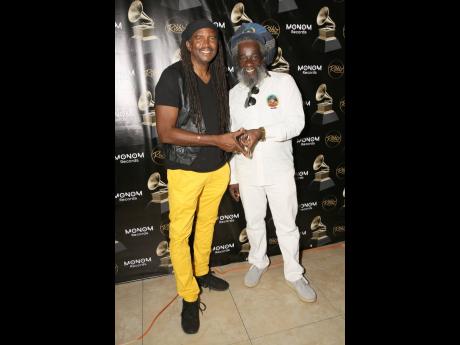That one handshake from Bob Marley to his son Julian ‘transcend some power’
Grammy Award-winning artiste says being Marley ‘sometimes close doors’
When Bob Marley and the Wailers played at their largest ever UK concert at the Crystal Palace Bowl on June 7, 1980, numbered among the record-breaking 30,000 people which turned out to watch him perform was his son, Julian. The youngster, who had celebrated his fifth birthday three days earlier, recalled having a two-minute interaction with his father that day. And although it would be the last time Julian would see his dad in the flesh, he received a handshake, the touch of which has lasted a lifetime.
“The only memory of him [Bob Marley] is going to Crystal Palace and he was performing for the Uprising Tour. I remember going to the show with my mother and some friends and making my way backstage, somehow. And I remember going into the dressing room which was an outside tent. At four and five, yuh can’t expect a little youth to sit down and observe everything ... that’s the ting. I came in and see the man stand up inna him red, gold and green jacket. I came in and shake him hand and then [claps hands] mi neva see him again. Cause by the next tour dem seh him was sick. That was the time ... two minutes. I neva remember nuh more than two minutes. But that ... dat likkle handshake... yeah... yeah ... it transcend some power,” a smiling Julian Marley told The Sunday Gleaner.
Julian has a lot to smile about. He is actually in celebration mode, having recently won the Grammy award, with his collaborator Alexx Antaeus, for their album, Colors of Royal. On Thursday night, family, friends and the music fraternity partied with them at the well-attended Grammy shindig at Ribbiz, at which Julian thrilled with a live performance showcasing some of the songs from the album.
His third Grammy nomination in the Best Reggae Album category, it was his first win and Julian spoke freely about the important lesson of humility that comes from not winning the first and second times and the actual surprise of winning.
“When yuh get nominated and seh for instance yuh don’t win ... it kinda prepare yuh mentally. Yuh get more humbled and grounded cause yuh don’t just fly off. Okay ... nominated. Oh ... yuh win. Is like yuh run bout 10 laps roun’ di park and yuh a sweat out. So we give thanks,” he said humbly, adding that, “it is a goosebump reaction because you put the soul in the music ... it’s an upliftment of Jah humbly showing yuh that keep on pushing with that message of music.”
Julian, whose bio describes him as a “British-Jamaican reggae singer, songwriter, producer and humanitarian”, is committed to the mission and the message, just as his father.
“My mission is the same mission whe yuh hear Samuel and Jeremiah and these great ones of the Bible who spread the message ... man like John ... not that John over there,” he said laughing and pointing to his road manager John. “We are the followers and the family of the Solomonic dynasty. We are the Psalm singers. It is God’s mission. It is not about me, it is about the Almighty.”
And, for him, it is certainly not about being born with the name Marley either, despite what some may say; it is more about “coming up from a very grounded foundation”.
“Yuh know what, sometimes when yuh name Marley, doors closed ... because they think that .... but you don’t know nutten bout me personally in the sense that where me come from. We come wid di name Marley, but where we grow in England ... most of my family in England, they are from very poor people. So, we come up ... our father come up from Trench Town so that mean seh him himself is [a] grounded person and him like grounded people,” stated the son of Lucy Pounder, who described his mother as a fairly strict parent, who made sure that you did your chores.
“It neva open up no door. It mek some people seh, ‘Yeah ... you again?’ What yuh mean you again? Like you again to. What yuh mean you again?” he said with a tinge of ire coming to the fore. “A name is a name, but it’s not about the name ... it’s about the soul and what yuh bringing,”
Getting a bit contemplative, he acknowledged that it was not usual “to see one man create so much youth who do music”.
“Normally yuh have lots of brothers and sisters and maybe one of them do music. But Jah seh watcha now, ‘This message must go across the four corners of the Earth.’ And Gong is one man ... just split it up ... five man ... Ky-Mani, Steve, Ziggy, Junior Gong, miself who do music as the brothers. So it’s just one of dem things deh,” he surmised.
Having recently come off tour where he played at places such California, New Zealand, Australia, Hawaii, Julian is gearing up for spring and summer tours and, while in Jamaica, made the time to shoot a new music video.
He has also seen the Bob Marley: One Love biopic, but shared that he will “haffi tek it in another time because yuh might watch it with too much criticising inna yuh mind”.
“But once you get the message out of the movie, just as how yuh would get it out the music, that is what it is really about for me. Mi see some people a rise up ... like reggae rise up ... rekindle the flame of Gong Marley. I actually feel like him deh somewhere around like yuh feel like yuh can go and meet him somewhere. That’s how the energy is in the air right now, like him wake again. God’s mission for the music ... yuh can’t mess with that. Is something everlasting. Like the sun rise every day, Jah works rise every day. Yuh cyaan stop that,” Julian declared.

